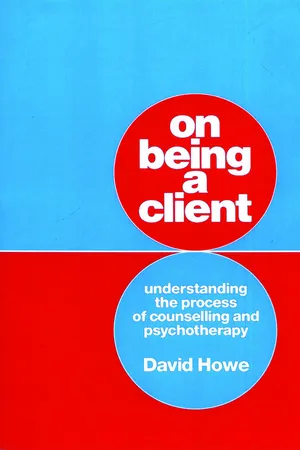
- 224 pages
- English
- PDF
- Available on iOS & Android
About This Book
`This book explores what clients have to say about their experience of the psychotherapeutic process. David Howe observes that, regardless of the therapist?s theoretical orientation, clients say similar things about their experience of being helped (and not being helped). It is the non-specifics of genuineness, a secure trusting atmosphere, empathy and warmth that offer the vehicle for encouraging a dialogue of personal intimate material, and of "making sense" and understanding when we are in pain, puzzled or worried.... This is an easy and gentle read.... For those interested in Attachment Theory, this would be a useful addition to their bookshelf? - Clinical Psychology Forum
There is a growing interest in what clients have to say about their experiences of counselling and psychotherapy. In a powerful analysis of this subject, David Howe identifies a number of clear and potent messages. He explores such questions as why clients say the things they say and why the therapeutic alliance holds out such promise, and, using the client?s experience as a platform, seeks to create a general theory of counselling and psychotherapy.
The author draws on a number of new and exciting ideas emerging in developmental psychology, sociology and the brain sciences to discuss the process by which the human infant becomes an individual as well as a competent social being. From the basis that the social and psychological structures which generate the client?s experience underlie all psychotherapeutic encounters, the book then explores how the self forms and then re-forms in social relationships, including those established during counselling and psychotherapy. In conclusion, the reader is invited to consider a number of thought-provoking claims about the universal qualities that characterize good and bad practice in all schools of counselling, therapy and the helping process.
Frequently asked questions
Information
Table of contents
- Cover
- Contents
- Acknowledgements
- Permissions
- Introduction
- Chapter 1 - Love and Work
- Part I - Accept Me
- Chapter 2 - Warm and Friendly
- Chapter 3 - Acceptance
- Chapter 4 - A Secure Base
- Part II - Understand Me
- Chapter 5 - Understanding People
- Chapter 6 - Knowing Other Minds
- Chapter 7 - Natural Psychologists
- Chapter 8 - Biology and Experience
- Chapter 9 - The Development of Social Understanding
- Chapter 10 - The Origins of the Empathetic Counsellor
- Part III - Talk With Me
- Chapter 11 - The Chance to Talk
- Chapter 12 - Description
- Chapter 13 - Narrative
- Chapter 14 - Dialogue
- Part IV - The Formation and Re-formation of the Self in Social Relationships
- Chapter 15 - The Formation of the Self in Social Relationships
- Chapter 16 - The Nature of the Counselling Relationship
- Bibliography
- Name Index
- Subject Index